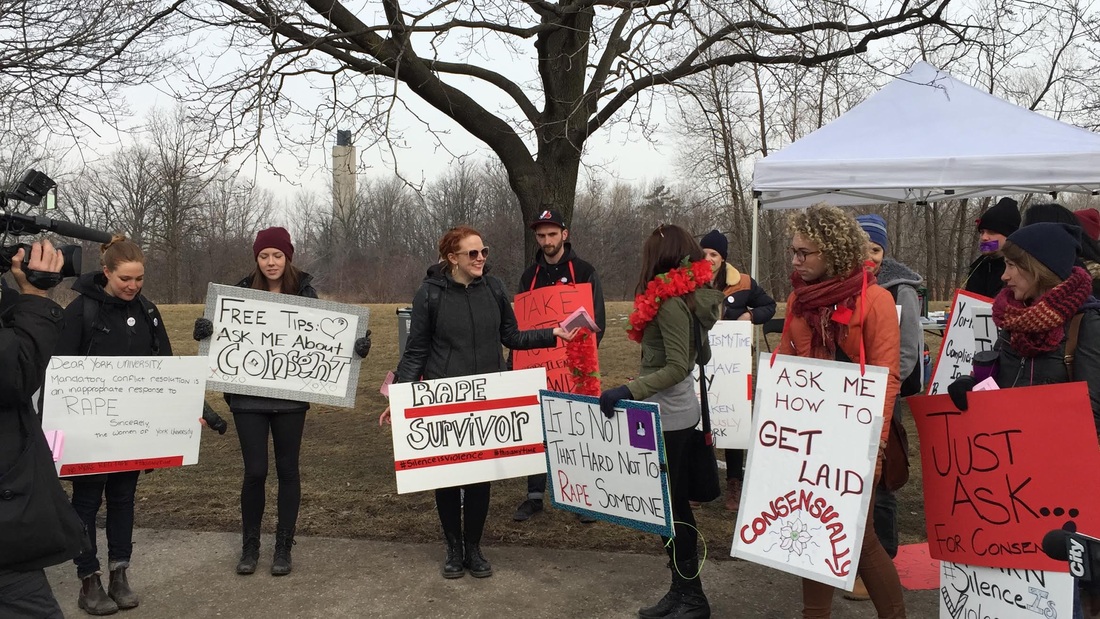|
By Mandi Gray with Emily Lockhart. Mandi Gray is a PhD student in the department of Sociology at York University. Prior to graduate school, Mandi worked with women and girls involved in the legal system.  This narrative is derived from pieces of an open letter I drafted to Mr. Mamdouh Shoukri, President of York University in Toronto, Canada. It was sent on March 2, 2015. The only thing I would change about the story is removing (alleged) when speaking about my rape and rapist. Initially, I was mostly concerned about potential defamation lawsuits following the criminal trial. I am a first year PhD student, teaching assistant and researcher at York University. Earlier this year I was raped by another PhD student who also attended my university. Within the last six weeks, he has been charged with one count of sexual assault and continues to attend my university. I do not seek to explore the details of my own rape but rather the systemic barriers that survivors of rape, assault and harassment must endure resulting in silencing and victim blaming which in turn account for significant re-victimization and traumatization. Following my rape, I was hesitant to come forward given the recent news reports regarding negative experiences of survivors on university campuses across North America. In my own logic, I figured that to by-pass the university investigation process I would go directly to the police to streamline the process. I am familiar with the criminal justice system and I knew what to expect having supported numerous survivors of sexual and gendered violence in my previous employment. I anticipated invasive questions regarding my sexual preferences and the subsequent slut shaming from the police. I did not anticipate that in addition to the criminal justice system, my university and employer (many PhD students are also employed by the university they attend) also felt entitled to conduct their own internal investigation despite criminal charges being laid against my rapist to determine the legitimacy of my allegations. I am disheartened and saddened that in 2015 this is the way we continue to treat survivors of sexual violence. These structures of oppression continue to silence survivors from seeking accountability of their perpetrators as the systemic processes are designed to deter women and other marginalized groups from seeking the help and safety they may require. The inadequate responses likely result in a number of women leaving their studies and/or workplace due to the ongoing trauma and re-victimization. This also tells perpetrators of sexual violence that this is accepted behavior and that their status as innocent until proven guilty outweighs the individual rights of the survivors of the violence. This also violates the rights of those who may come into contact with the perpetrator of violence likely with little knowledge of these allegations because his right to privacy is determined to outweigh the safety and security of all women the perpetrator may come into contact with. Next time you are assigned to work in a group project, or assigned to sit next to a colleague whom you have little information about – do you feel you have a right to know if he or she has a history of sexual violence against others in a similar situation to yourself? The recurring issue of the safety of other women on campus has been a site of little concern from university administrators and has lead me to question, how many of my classmates and professors have a history of sexual violence and/or harassment that has been officially recognized but not made public? From my own experience thus far, the media reports of campus mishandling of sexual assault reports do not even begin to scrape the surface of how deeply rooted misogyny and sexism remain within university policy and procedure (and lack thereof). For some reason, I envisioned that having criminal charges laid by the Crown Attorney, the university would have simply accepted this as sufficient proof and my claims would be substantiated (remember, the burden of proof for university findings of fact differ from that of the criminal courts). I imagined that the university would simply make a decision on how to proceed to ensure my safety and the safety of the other women on campus. Unfortunately, going to the police did not exempt me from being processed through the informal mechanisms of the university that seek to oppress and re-traumatize survivors with very little support through the process. In fact, at the time I was expected to participate I had not even yet received any counseling relating to the assault due to the long wait lists at the sexual assault clinic I attended. Every day since reporting that the individual had been arrested to university administrators, I have been waiting for answers despite my university releasing a sexual assault policy just hours after my own safety planning meeting with security services. It took nearly three weeks for any concrete information in regards to what the process will be moving forward. I now have answers, but am forced to participate in multiple university tribunal processes that I have never wanted to be apart of. In addition to having to deal with the trauma of the assault, I also have trauma from the institutional responses of reporting to the police and my university. My days have become structured around a constant state of waiting for answers from my university regarding whether or not I will have to be confronted with the man charged with raping me on campus. I have had to take a leave of absence from my teaching duties and drop a class because the numerous calls and emails in hopes of getting half-answers or dates to anticipate. On numerous occasions I have been patronized that this process is survivor-centric and that my needs are the first priority. Although feminist rhetoric has been co-opted into institutional policy, it continuously and systemically fails to adequately meet the complex needs of survivors. Each phone call and email I am forced to make to find out what is happening and explain the impact upon my own mental health is another instance of re-victimization and re-traumatization. It disgusts me that the act of being raped becomes easy in comparison to having to re-live the experience everyday at the hands of an institution that I quite literally pay to attend. I anticipated such a response from the police (and I received the anticipated response which one day I will be ready to talk about) but not from my university that I chose to attend for its clearly stated commitment to social justice within its mission statement. I chose to apply to graduate studies at York University because of its reputation as an institution that embodies values of social equity and justice and as a leader for progressive politics and social justice initiatives. Unfortunately, my vision of what York University once represented has been completely shattered by this experience. This has demonstrated that what is written on paper and in mission statements holds no value if it is not intertwined with actions that match the language utilized. Unfortunately, as a survivor, I must come to terms that my entire life is structured around a waiting game that I have no control over. I am waiting to hear from the attorney assigned to the case, from the courts in regards to the next hearing and from my university who are proceeding with this in the form of tribunal as if this is simply a group assignment that resulted in disagreement. Waiting becomes a constant state of uncertainty that cannot be escaped. I have learned to accept that my days revolve around uncertainty, half-answers and more questions about what the next few years of my life will look like. I question myself in making the decision to hold this person accountable and I question the institutional and systemic barriers that place survivors of violence on trial and their every decision scrutinized and questioned. I have come forward with my story publicly to challenge preconceived notions of what a victim/survivor looks and acts like; I have requested that the often mandatory publication ban to protect the identities of the victim be removed from my case because in protecting my identity will also protect his. I did nothing wrong that night, I am not ashamed of my actions or my decisions and even if the courts find him not guilty (which unfortunately, is a high likelihood given the issues of prosecuting sexual assault cases), our colleagues and friends will be able to make their own decisions as to what happened that night with all the facts presented. Read the original open letter. Sign Mandi's petition.
0 Comments
Your comment will be posted after it is approved.
Leave a Reply. |

 RSS Feed
RSS Feed